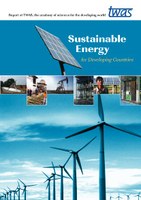 Nearly 2 billion people in the world, by some estimates, lack basic energy services. Expanding access to basic energy in the South is a prerequisite for poverty reduction and development, and for meeting the Millennium Development Goals (MDGs), say Dilip Ahuja and Marika Tatsutani in the current issue of the TWAS Newsletter.
Nearly 2 billion people in the world, by some estimates, lack basic energy services. Expanding access to basic energy in the South is a prerequisite for poverty reduction and development, and for meeting the Millennium Development Goals (MDGs), say Dilip Ahuja and Marika Tatsutani in the current issue of the TWAS Newsletter.
Yet, at the same time, developing countries face a second challenge: participating in a global transition to clean and sustainable energy, to ensure a better future for all. While increasing energy production, say Ahuja and Tatsutani, developing countries have an opportunity to 'leapfrog' to cleaner technologies, learning from mistakes made in the developed world.
The authors outline four steps of concrete actions that developing countries can take to meet this double challenge:
- energy efficiency: institute policies to promote energy efficiency, including standards for automobiles, appliances and equipment, and codes for buildings.
- subsidy reform: reform and re-direct energy subsidies, to avoid artificially reducing fuels prices, which increases consumption and discourages adoption of cleaner technologies;
- indigenous sustainable resources: governments should support, and research communities identify and develop, promising indigenous renewable energy resources and technologies;
- technology transfer and capacity building: seek development-country support for effective transfer of advanced energy technologies, while building indigenous capacities.
The TWAS Newsletter article, 'Making the move to sustainable energy', summarizes the main findings of the TWAS Research Report Sustainable Energy for Developing Countries. The report -- also authored by Ahuja (ISRO Professor of Science and Technology Policy at the National Institute of Advanced Studies, NIAS, Bangalore, India) and Tatsutani (independent consultant with more than 15 years experience in energy and environmental policy) -- can be downloaded as PDF file from the link below.

